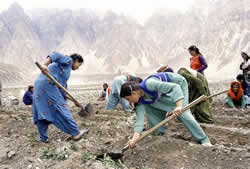 http://www.dailytimes.com.pk/default.asp?page=story_16-10-2003_pg7_43
http://www.dailytimes.com.pk/default.asp?page=story_16-10-2003_pg7_43Daily Times
Thursday, October 16, 2003
 http://www.dailytimes.com.pk/default.asp?page=story_16-10-2003_pg7_43
http://www.dailytimes.com.pk/default.asp?page=story_16-10-2003_pg7_43
Daily Times
Thursday, October 16, 2003
ISLAMABAD: Nestled amid the towering Himalaya, Hindukush and Karakoram ranges, communities in Pakistan’s Northern Areas have undergone a silent socio-economic upheaval in the past 20 years.
With $100 million, a development network headed by Prince Aga Khan, spiritual head of the Ismaelite sect, overhauled the region from a network of sleepy, marginalized communities in 1982 to a vibrant region boasting schools, healthcare, hydro-electric power schemes and even a micro-finance bank. The Northern Areas is home to 1.2 million people spread across 1,123 villages.
The peace and calm which accompanied this social change is in sharp contrast with the neighbouring tribal areas bordering Afghanistan. “The fact that they are situated near one of the most lawless areas of the region indicates that change at grassroots level has created strong village economies and in the process kept them away from lawlessness,” said general manager of the Aga Khan Rural Support Programme (AKRSP) Izhar Hunzai.
The Aga Khan and his father were regular visitors to the area during the prince’s childhood, when he developed a special affection for its people, said Hunzai, who hails from the picturesque Hunza valley. More than one-third of the population are Ismaelites, an offshoot of Islam’s Shiite sect. Shiites and followers of the dominant Sunni sect of Islam also live in the Northern Areas.
The AKRSP revolves around community-based organisations which carry out development projects. “Our job is to facilitate and monitor...we sit there as observers,” Hunzai told AFP. Some 61 percent of girls in the Northern Areas attend school, compared to 50 percent nationally.
The per capita income of the area was less than 25 percent of the national per capita income in the early 1980s. By 1998 it was 49 percent, or $245 compared to the national average of $500, according to the AKRSP.
The AKRSP has helped irrigate 90,000 acres of barren land over the last 20 years by building micro-hydelectric power projects.
“This cooperative phenomenon has created a culture of progress and tolerance which is absent from its neighbouring communities,” said Hunzai. Key to much of the progress is the First Micro Finance Bank, with a capital base of Rs 400 million.
“The micro-finance bank... has produced a sea change in the lives of people. Now we can see more farming, more cultivation and even more market enterprise in the area,” said Hunzai. —AFP